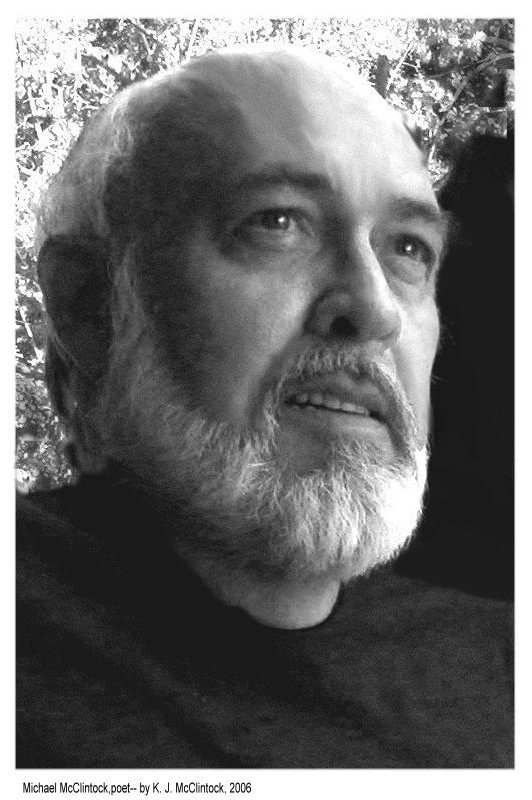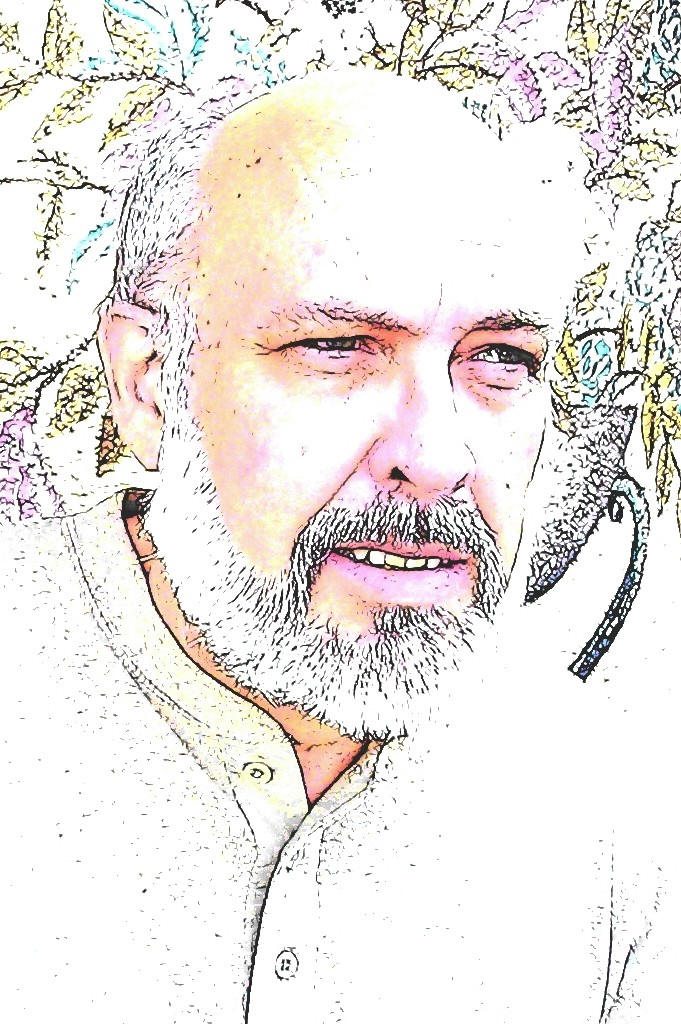The HyperTexts
Michael McClintock


Michael McClintock, Portrait by Karen J. Harlow
Michael Windsor McClintock was born on March 31, 1950 in Los Angeles, California. McClintock
received his education at Occidental College and the University of
Southern California, where he specialized in Asian Studies, English and American
Literature, and Information Sciences.
In the late 1960s, he was the Assistant Editor of Haiku
Highlights. During the 1970s, he was the Assistant Editor of Modern Haiku
and also edited the American Haiku Poets Series and Seer Ox: American
Senryu Magazine. In 2001 McClintock retired as Principal Librarian and
Administrator for the County of Los Angeles Public Library. He
currently writes the "Tanka Cafe" column for the Tanka Society of America
Newsletter, and edits The New American Imagist series for
Hermitage West. His collections of haiku, senryu, tanka, and other poetry include Light Run
(Shiloh, 1971), Man With No Face (Shelters Press, 1974), and Maya:
Selected Poems (Seer Ox, 1976). His work has been anthologized in each of the three editions of The Haiku Anthology, edited
by Cor van den Heuvel (1974, 1986, 1999). The Tanka Anthology, edited
by McClintock, Pamela Miller Ness, and Jim Kacian, was released in
December 2003 by Red Moon Press (232 pp., hardback, $24.95, ).
an old photo
of my parents
young and happy—
of all the things I own
that is the saddest
From The Tanka Anthology (Red Moon Press, 2003)
when you opened
my letter
were you surprised
my heart
fell out?
From American Tanka #9, Fall 2000; The Tanka
Anthology (Red Moon Press, 2003)
next door
the lovemaking
subsides
stars fall
from other worlds
From American Tanka #9, Fall 2000; The Tanka Anthology
(Red Moon Press, 2003)
Once in a Meadow, Near Los Osos
A poppy . . .
a field of poppies!
the hills blowing with poppies!
God of Abraham, Isaac, and Jacob,
the One who with a single thought
brought into existence the universe,
God of the Exodus and the empty tomb:
In the year the snows came late
when the coastal ranges alone made room for spring,
many times dandelions delayed my journey,
their faces all innocent, clean, wholesome—
They called me off the road,
they unraveled my purpose like a spool
and threw away my coat, crowding in upon me,
they and the daisies and the poppies—
Most especially the poppies, fields of them,
in riot and aflame, wanton and loving with color.
My heart was rampant and willing
and so into their beds I went radiant
and sprawled naked among them,
embraced and kissed, flaring like a candle.
God forgive me what was done
among the dandelions, the wildflowers,
most especially the poppies.
From Modern Haiku 34.1, Winter/Spring 2003; anthologized in
Contemporary Haibun #4, 2003
Raspados
The hour when the horned dog sleeps, that hour,
And the moon's a pale, humid smear in the sky
Over the freeway, the electric plant, the brewery,
The blocks of warehouses, that moon
At the end of the long avenue, suspended
Above the trees and small homes and apartments
And the evening air's a moist breath of voices, those
voices
At the end of all the long avenues, our voices
Tired in the dark, the languid hour after dinner,
Tired from the world's canning, the world's stitching
machines, The lathes and hot lights and liquid metals,
The smell of grease and ozone, cement and tar,
Deaf from the buzzing saws,
Deaf from the hammering presses,
Deaf from drills endlessly drilling, ceaselessly
Laboring for that foot in the ass—
There is an old man from Calexico,
A man mute and blind in one eye,
Who comes along pushing a small cart
Carrying rainbows of color on shaved ice,
Syrups of orange and yellow and green,
Cool fantasies in sugar for a dollar.
We listen for him, his sound
The dreamy tinkling of tin bells
Coming out of the purple splash
Of tree-shadow—our eyes on him,
Finding him, the only man in the world
Good for the eyes at that hour—that man
Selling syrups on sparkled ice, bringing to us
Sweet, cooling, tasty raspados.
From
Pemmican, 2002; American Haibun and Haiga, No. 3, 2002; Brushwood
No.1, Anthology of the Nobuyuki International English-language Haibun
Competition, British Haiku Society, August 2002, winner, 2nd place prize, best
from an American author
Whales at Santa Cruz
This place she loved above all others on the coast,
at this same time of year, the fall.
We came each year to watch the whales.
She was small and from the gulls she had learned
how to lean forward and balance herself against
the blast of wind.
She was propped on pillows and sitting up in bed
when with that same motion she leaned forward and died.
I have waited for darkness; it is illegal to release
human remains here.
I am told three hundred whales will pass this rock point
tonight.
As they pass, they will sing.
I have heard before the voices of these creatures, on
recordings;
I have sampled their grammar and measured the entropy of
their phrasing:
the clicks and squeals, the unpredictable trilling,
the small chirps like those in a twilit garden
at the borders of hearing.
I have come to a few conclusions about those songs,
their theme and sequence,
but they are improbable conclusions.
The kelp forest stirs in the neap tide,
the wind is light.
A giant's sleeping breath fills the space
above the sea.
The emptied urn—
a good size for holding
flowers come spring
From So Luminous the
Wildflowers: an Anthology of California Poets, Tebot Bach, 2003; Modern Haiku,
Vol. 34.1, Winter/Spring 2003
The Song in Old Men
idle summer day
sucking the meat
from a fig
As an old man, I dream the seasons out. October reds and
yellows bury my house, and through winter I nod over the songbook of Ra, feeding
sticks to the fire. What else have I to do?
lazy me,
autumn’s leaves
stay unswept
Pale morning light condenses starlight’s unutterable
simplicity to water-beads on the window. The wet hand of the fog stirs and
wakens each folded, sleeping thing — the secret heart and flower dream of seed
pods, the mouth-parts of moths, the wrapped leaf becoming a butterfly, the
cosmos inside a newt’s cold egg.
Astonished, I see with what holy bearing the greater
cloven force of earth comes to each quiet, waiting form, how each lifts and
rises to meet the ocean-borne baptism. A few weeks yet, and on forest floor, and
up where the high meadow hangs on the ice-ledge, the wild, bright storms of
spring will blossom in rainbowed cataracts.
What then remains to do? Past fennel-cutters on a
hillside, wet in fog, fast and single-hearted I am swimming the steep upward
stream, through clouds in rifts and singing foams, to the water-tombs, where I
am promised rest in a sunlit pool, where beneath the hardwood tree I will sleep
as promised, my eternal year as loved one, the husbandman of death: pillowed,
covered, dreamless.
spring moon . .
.
moth to
iris
From Modern Haiku, Summer 2003
Men of Property
I let my eyes and hands run over the tools he had used –
the trowel, the spade, the mulching fork. I gazed at the few remaining tin
pails, enameled green, and recalled how the one got its crimped side and the
other its bullet hole. I pocketed the worn canvas gloves; the man buying the
place had much smaller hands than dad’s, and could not wear them. But all the
tools and pails and contents of the shed he said he would use, and would be
grateful to have them.
I stepped out of the shed and walked onto the broad
sloping hillside, only a small corner of which belonged to the property. The
shed was planted in the middle of six rows of fruit trees, six trees to a row,
with extra room made for the shed and open ground around it for loading boxes
with fruit from the buckets: oranges, lemons, plums. I could still hear my
father from somewhere in the trees calling to my brother and me, to bring him a
ladder, or come get the dog, or haul out the pails full of fruit, or stop
horsing around and go in to supper—he’d follow.
hefting a plum –
I know by heart
my father’s orchard
From Frogpond, xxvi.3, 2003; anthologized in Red Moon Anthology,
2004
The HyperTexts
